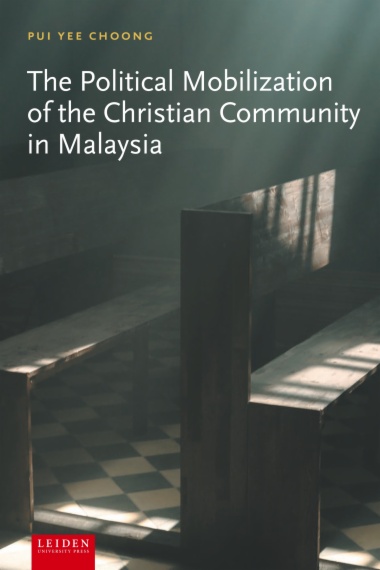Spanning Malaysia’s post-independence period, and using the repression-mobilization nexus as a key theoretical framework, this study outlines how its Christian community delicately and simultaneously defends its religious rights without being construed as anti-Islam in the face of state-led “Islamization”. By primarily focusing on the 1980s to the contemporary period, while considering subnational differences between East and West Malaysia, this study charts the changes in the community’s tactics of resistance and explains why it chose to adopt a non-partisan and non-violent approach despite targeted repression. In outlining the interplay between a minority community’s mobilization and national-level contestation, it focuses especially the role played by the Christian elites. Additionally, it raises key questions that remain relevant in the study of contentious politics: How do minority community in semi-democratic contexts protect their rights? What are their options and constraints for resistance? And how do changes in the political environment mould their strategy and tactics of resistance?
- Cover
- Contents
- List of abbreviations
- Acknowledgments
- Chapter One: Contextualiz6ing and Theorizing Christian Political Mobilization in Malaysia
- Overview
- Objectives, scope, methods, and limitations
- The repression–mobilization nexus: A contested relationship
- The matter of regime type and political context
- Towards a typology of repression and mobilization
- Political mobilization and alternative responses
- Of framing, resources, and political opportunities
- Chapters
- Chapter Two: A Competitive Authoritarian Regime, Islamization, and the Christian Community
- Introduction
- Under a competitive authoritarian regime
- Christians and Christianity in Malaysia
- Overview
- Christianity and decolonization
- The Islamization processes
- Overview: From the ‘dakwah’ movements to political rivalry
- Process 1: State-led Islamization
- Process 2: The politicization of Islam
- The general effects of Islamization
- Islamization’s specific effects on Christians
- Prohibition of preaching to Muslims
- Prohibitions on using select Malay and Arabic words
- Restrictions on the importation of Christian literature
- Church buildings, lands, and burial grounds
- Management of missionary schools
- Overt and surreptitious conversions of Christians
- Conclusion
- Chapter Three: Unflinching Principles and Whimpers of Protest, 1980–90
- Introduction
- Initial responses to state-led Islamization
- Introduction of regulatory repression in the early 1980s
- Banning of the Al-Kitab
- Restrictions on using ‘Islamic’ words
- Targeted repression in the early 1980s
- Resisting repression
- Defying state policy under the pretext of nation-building
- Forging networks and alliances
- Fledgling electoral mobilization
- Operasi Lalang and its aftermath
- Several Christian experiences
- Moving towards principled engagement
- Legitimizing civil disobedience in the Kuching Declaration
- Conclusion
- Chapter Four: Learned Submission to Semi-opposition Engagement, 1991–2002
- Introduction
- Reasons for the community’s apolitical approach
- Closed-door meetings and mixed results
- Absence of enforcement
- Learned submission and fear of repression
- Growth of Pentecostal-Charismatic churches and intra-Christian divisions
- The Reformasi: A catalyst of political mobilization?
- Electoral mobilization in the 1999 general election: Of official and unofficial voices
- Resisting the push for an ‘Islamic state’
- Targeted repression and subsequent responses
- The Shah Alam Church of Divine Mercy
- The ‘Srigala Incident’ and other Orang Asli-related incidents
- Attacks on churches in the context of the ‘War on Terror’
- Conclusion
- Chapter Five: Seizing Political Opportunities for Mobilization, 2003–7
- ‘A breath of fresh air’
- Arbitrary enforcement of regulatory repression
- Restrictions on religious texts
- Demolition of Orang Asli churches
- The Silibin Incident
- The growing jurisdiction of the Sharia court
- Grassroots-level Christian mobilization
- Emergence and further polarization
- Invoking the Federal Constitution
- Relationship with other mass rallies
- Electoral mobilization
- NECF’s ’40-Day Fast and Prayer’ initiative
- Oriental Hearts and Mind Study Institute
- Conclusion
- Chapter Six: From Resisting Repression to Oblique Oppositional Mobilization, 2008–15
- Introduction
- Contestations over usage of the word ‘Allah’
- Notable court cases
- The Herald
- Sidang Injil Borneo
- Jill Ireland
- Collective rather than Separate Cases
- The ‘10-Point Solution’ and the Sarawakian context
- Targeted repression by the Selangor Islamic Department (JAIS)
- New standard operating procedures pertaining to Christian publications
- Increased political mobilization
- The logic of repression
- The NECF’s ‘Nation-Building Agenda’
- Electoral mobilization
- Grassroots mobilization
- Mobilizing through various outlets of expression
- Divergent approaches within the Christian community: A comparison
- Conclusion
- Chapter Seven: Stories from the East: Resisting Islamization and Preserving Local Rights
- Introduction
- Christians in East Malaysia
- Sabah
- Historical overview and federal–state tensions
- Explaining a lack of resistance to state-led Islamization
- Emergent resistance
- Religious misclassification
- Conversions of indigenous Christians
- Grassroots mobilization and traditionalism
- Sarawak
- The anomalous case?
- Relationship between Christian leaders in Sarawak and Peninsular Malaysia
- Church–state relationships and divergent views
- Politicizing religious sentiment in Sarawak
- Conclusion
- Chapter Eight: Conclusion
- Introduction
- Electoral dynamics after Barisan Nasional’s defeat
- Principled strategies, pragmatic resistance
- Typologies and sequences of resistance
- When defending rights also means opposing the regime
- Emphasizing the importance of subjective interpretations
- Closing remarks: Old structures, new manifestations?
- Bibliography
- Books
- Journal articles
- Theses and dissertations
- Newspapers (printed)
- Court cases, Statements and Letters
- Surveys
- Reports
- Government reports
- Organization reports
- Online sources
- Interviews
- Appendix A: Official Letter from Najib Razak to Bishop Moon Hing Ng Proposing a 10-Point Solution
- Index

